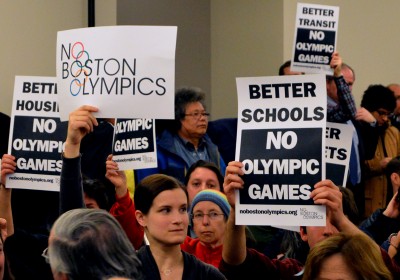Olympic organizing committee Boston 2024 printed a full-page advertisement in Monday’s copies of The Boston Globe and The Boston Herald, stating it would only seek to host the 2024 Summer Olympics if a set of ten points were met in its “final bid.”

In January, The United States Olympic Committee chose Boston as the U.S. bid for the 2024 Olympics. The International Olympic Committee will choose the host city for the 2024 games in 2017, and if chosen, Boston will be the first U.S. city to host the Olympics since Salt Lake City held the 2002 Winter Olympics.
The final point listed on the Boston 2024 advertisement expressed a desire for public support in moving forward with the bid.
“A majority of people in Massachusetts support bidding for the 2024 Olympic and Paralympic Games,” the advertisement stated.
The advertisement also wrote about the need for tens of thousands of jobs to be created leading up to the Olympics, as well as the need for the Olympics to serve as a catalyst for improvement in public transportation and infrastructure throughout Boston.
Within the advertisement, Boston 2024 also reiterated how helpful the committee believes the Olympics will be for Boston.
“Boston is a world-class city, and it will remain a world-class city whether or not we host the 2024 games,” the advertisement stated. “But we believe hosting the 2024 Olympic and Paralympic Games will serve as a once-in-a-lifetime catalyst for economic growth and investment in our future.”
Richard Davey, CEO of Boston 2024, said in a Monday press release he wanted the people of Massachusetts to see and understand Boston 2024’s goals for both the Olympics and for the city.
“Boston 2024 wants to be transparent about our goals for a Boston Olympic Games, and we expect to be held accountable by the public for delivering on these principles,” Davey said in the release. “We believe the 2024 Games fit into the long-term planning goals of the city, and will create jobs, economic development and affordable housing. We also want to be clear that we are only in this if we have a majority of the people in Massachusetts behind us.”
Steve Burgay, the senior vice president for external relations at Boston University, said BU is not opposed to being involved with the games should they come to Boston.
“In a broad sense, we think it’s terrific that 2024 is up and running and has been nominated as a candidate. We’re very excited about that. At the same time, we need to really look at the practicality and the feasibility of having the BU campus involved,” Burgay said. “We’re not opposed to it at all, but at the same time, it needs to work in the context of us being a campus.”
Burgay also said no plans have been set in stone for the use of BU facilities for the Olympic and Paralympic games.
“We have discussed the possibility of using Agganis Arena for at least one event, possibly using our practice fields, and possibly using StuVi 2 [Student Village II] to host members of the international media, but they’ve made it clear that these are all tentative possibilities, and the real serious conversation about whether or not it’s practical has yet to take place,” he said.
Several important aspects of the plan would need to be analyzed prior to a commitment, including costs and the possibility of imposing on summer activities, Burgay said.
“We have to analyze the wisdom of the university’s participation by looking at a few variables. Would the facilities be available? How much money would the 2024 Committee pay to use those facilities? We would not use tuition money for those Olympic games, so the committee would need to rent those facilities,” he said. “We would need to ascertain whether or not the use of our facilities would negatively affect the activities that usually occur on our campus during those summer months.”
Several residents said they are uncertain whether or not hosting the Olympics will have a distinct benefit on the city.
Owen Conley, 23, of Brighton, said he isn’t convinced of the economic benefits that Boston Olympics supporters say will occur.
“There doesn’t seem like much benefit to having it here, but I’m not anti-Olympics by any means. I just don’t feel like the supposed economic benefits of having the Olympics will be met,” he said. “If you look at the long-term effect of having them in China or even the World Cup in Brazil, there are often more problems and controversies than economic benefits.”
Adrienne Calotta, 27, of Allston said adding infrastructure purely for the games is a waste.
“It’s a bad idea. The T can’t even handle the current population, and they’re talking about pop-up venues, and that money is going to finance something that isn’t going to be permanent,” she said. “It’s better to allow someone else with better existing infrastructure take this on.”
Daniela Mariluz, 28, of Brighton said she is conflicted and acknowledges the pros and cons of the proposal.
“I’ve been reading about it, and there are a lot of pros and cons,” she said. “While some of the neighborhoods are going to be raising rent, there will also be jobs. However, I think those jobs will only be around that time, so it’s important to see what happens after the Olympics, with all of the Olympics, all of the jobs, all of the buildings. Those jobs won’t be there, and it’s important to look ahead.”




